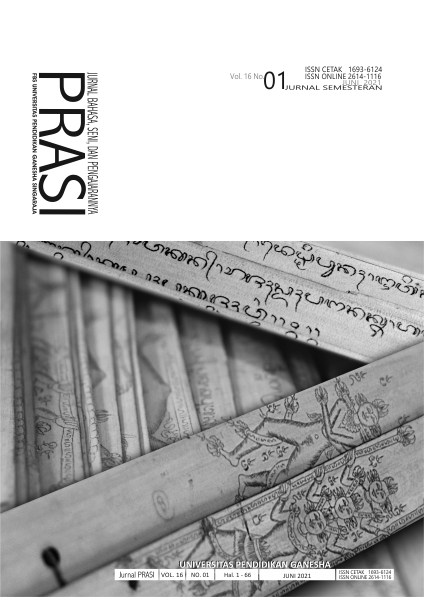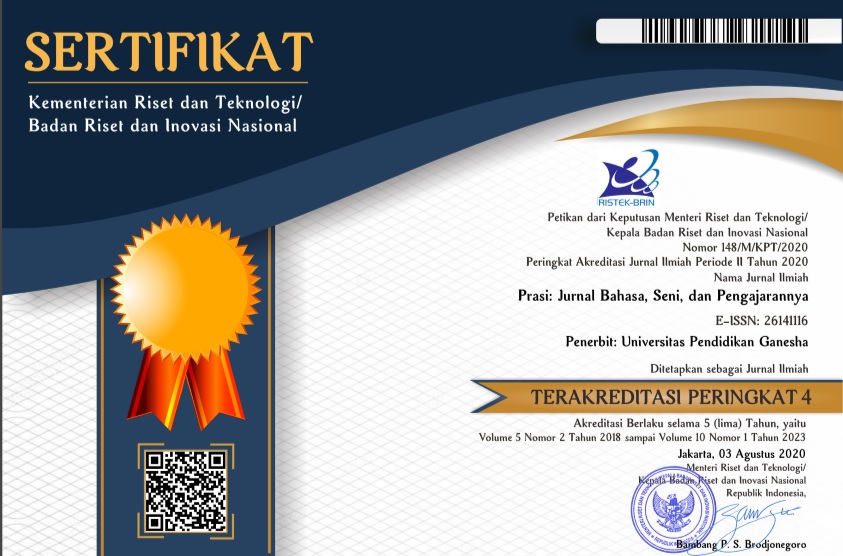THE EFFECT OF SELF-ASSESMENT ON STUDENTS’ SELF-EFFICACY AND WRITING COMPETENCY
DOI:
https://doi.org/10.23887/prasi.v16i01.31155Keywords:
self-assessment, , writing competency, self-efficacyAbstract
ABSTRACT
In this Covid 19 pandemic, learning should be done from distance through online learning. This study aims at investigating the effect of self-assessment on students’ self-efficacy and writing competency simultaneously and separately on online learning. To run this research, 52 eleventh grade students of SMAN 1 Sukasada in the academic year 2020/2021 were chosen as the samples. This research applied nonequivalent control group design in which there were two groups compared, namely: self-assessment and conventional assessment. The data of writing competency were collected by using performance test which were then scored by using analytical scoring rubric, meanwhile self-efficacy data were collected by using questionnaire. The collected data were then analyzed by using One Way MANOVA. This research discovered: (1) there is no significant effect of self-assessment on self-efficacy and writing competency simultaneously (p>0.05), (2) there is no significant effect of self-assessment on writing competency separately (p>0.05), and 3) there is no significant effect of self-assessment on self-efficacy separately (p<0.05).
References
Alkhalaf, S., Drew, S., and Alhussain, T. (2012). Assessing the impact of e-learning systems on learners: a survey study in the KSA. Procedia - Social and Behavioral Sciences 47, 98 – 104.
Andrade, H., and Du, Y. (2007). Student responses to criteria‐referenced self‐assessment. Assessment & Evaluation in Higher Education. Vol 32(2), 159-181.
Arsyad,A., Nadrun and Budi. (2015). Using self-assessment technique to improve students’ writing skill of the eleventh grade. e-Journal of English Language Teaching Society (ELTS). Vol. 3(2), 1-12.
Baleghizadeh, S., & Masoun, A. (2014). The effect of self-assessment on efl learners’ self-efficacy. TESL Canada Journal, 31(1), 42. https://doi.org/10.18806/tesl.v31i1.1166
Bilfaqih, Y and Qomarudin, M. N. (2015). Esensi Penyusunan Materi Pembelajaran Daring.Yogyakarta: Deepublish.
Black, P., Harrison, C., Lee, C., Marshall, B., & Wiliam D. (2003). Assessment for Learning: Putting it into Practice. Berkshire: Open University Press.
Candiasa, I.M. (2010). Pengujian Instrumen Penelitian Disertasi Aplikasi ITEMAN dan BIGSTEPS. Singaraja: Unit Penerbitan Universitas Pendidikan Ganesha.
Celce-Murcia, M. (2001). Teaching English as a Second and Foreign Language. Boston: Heinle & Heinle
Chen, Y. M. (2008). Learning to self-assess oral performance in english: a longitudinal case study. Language Teaching Research. Vol 12(1), 235-262.
Comert, M and Kutlu, O. (2017). The effect of self-assessment on achievement in writing in english. Journal of Education Science Research. Vol 8(1), pg 102-118.
Dharma, I.P.S and Adiwijaya, P.A. (2018). The effect of problem based learning and self-assessment on students’ writing competency and self-regulated learning. SHS Web of Conferences 42.
El-Seoud, A. (2014). E-Learning and Students' Motivation: A Research Study on the Effect of E-Learning on Higher Education. iJET. Vol 9(4) available at https://online-journals.org/index.php/i-jet/article/view/3465.
Fahimi,Z and Rahimib, A. (2014). On the Impact of Self-Assessment Practice on Writing Skill. 2nd GLOBAL CONFERENCE ON LINGUISTICS and FOREIGN LANGUAGE TEACHING.LINELT-2014.Dubai – United Arab Emirates, December 11 – 13.
Harmer, J. (2006). The Practice of English Language Teaching. Cambridge: Pearson Longman.
Hartley, DE. (2001). Selling e-Learning. American Society for Training and Development.
Kellogg, R.T. (2008). Training writing skills: a cognitive development perspective. Journal of Writing Research. Vol 1(1), 1-12.
Marhaeni, A.A.I.N. (2005). Pengaruh Assessment Portfolio dan Motivasi Berprestasi dalam Belajar Bahasa Inggris terhadap Kemampuan Menulis dalam Bahasa Inggris. Unpublished Dessertation: Proram Pascasarjana Universitas Negeri Jakarta.
Mekheimer, M. (2005).Effects of Internet-based Instruction, using Webquesting and Emailing on Developing Some Essay Writing Skills in Student Teachers. Published PhD, Cairo University.
Mills, N., Pajares, F and Herron, C. (2007). Self-efficacy of College Intermediate French Students: Relation to Achievement and Motivation. Language Learning, Vol 57(3), 417–442. https://doi.org/10.1111/j.1467-9922.2007.00421.x
Noesgaard, SS and Ørngreen, R. (2015). The Effectiveness of E-Learning: An Explorative and Integrative Review of the Definitions, Methodologies and Factors That Promote e-Learning Effectiveness. Electronic Journal of e-Learning, Vol 13(4), 278-290 2015.
Orsmond, P., Merry, S. and Reiling, K. (2000). The Use of Student-derived Marking Criteria in Peer- and Self-assessment. Assessment and Evaluation in Higher Education. Vol 25(1) pg. 23–39.
Paramartha, A.A.G.Y. (2016). Exploring the role of self-efficacy in the implementation of self-assessment for english writing. Jurnal Pendidikan Indonesia. Vol 5(1), 56-68.
PERMENDIKBUD No 23 tahun 2016 tentang Sistem Penilaian Pendidikan.
Ratminingsih, N. M., Marhaeni, A. A. I. N., & Vigayanti, L. P. D. (2018). Self-assessment: the effect on students’ independence and writing competence. International Journal of Instruction, 11(3), 277-290. https://doi.org/10.12973/iji.2018.11320a.
Rolheiser, C and Ross, J.A. (2003). Students self-evaluation: what research says and what practice shows. Available at http://www.cdl.org/resourcelibrary/articles/self_eval.php
Rosenberg, M.J. (2001). E-learning: Strategies for delivering knowledge in the digital age. New York: McGraw-Hill
Sadikin, A and Hamidah, A. (2020). Pembelajaran Daring Di Tengah Wabah Covid-19. Jurnal Ilmiah Pendidikan Biologi, Vol 6(2), 214–24.
Topping, K. J. (2003). self and peer assessment in school and university: reliability, validity and utility. In M. Segers, F. Dochy, & E. Cascallar (Eds.), Optimising new modes of assessment: In search of qualities and standards (Vol. 1, pp. 55-87): Springer Netherlands.
Zimmerman, B. J. (2001). Self-efficacy: an essential motive to learn. Contemporary Educational Psychology, 25(1), 82–91.
Downloads
Published
Issue
Section
License
Authors who publish with Prasi agree to the following terms:- Authors retain copyright and grant the journal the right of first publication with the work simultaneously licensed under a Creative Commons Attribution License (CC BY-SA 4.0) that allows others to share the work with an acknowledgment of the work's authorship and initial publication in this journal
- Authors are able to enter into separate, additional contractual arrangements for the non-exclusive distribution of the journal's published version of the work (e.g., post it to an institutional repository or publish it in a book), with an acknowledgment of its initial publication in this journal.
- Authors are permitted and encouraged to post their work online (e.g., in institutional repositories or on their website) prior to and during the submission process, as it can lead to productive exchanges, as well as earlier and greater citation of published work. (See The Effect of Open Access)


.png)
.png)









